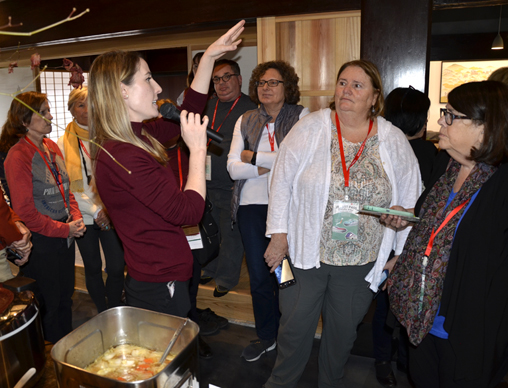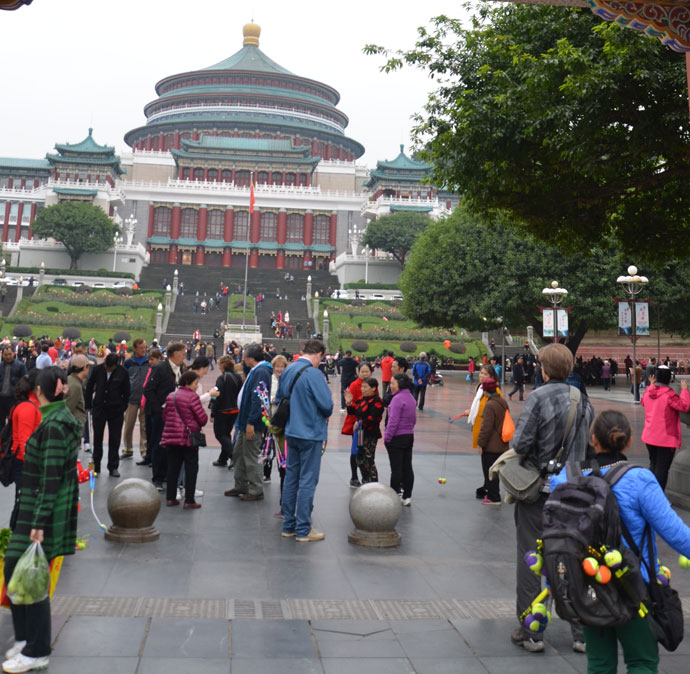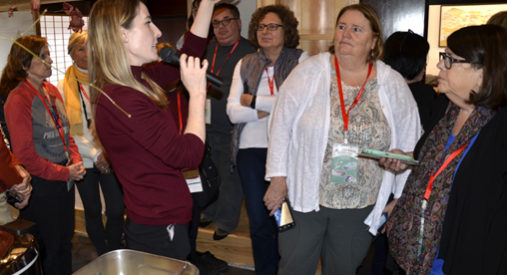
Freelance members of the Society of American Travel Writers interested in agritourism in the Tohoku region north of Tokyo sample traditional Japanese cuisine and locally produced wine at a rustic restaurant outside the city of Sendai
“You have the best job in the world,” remarked a person I was introduced to at a dinner party. I’ve often heard that mixture of admiration and envy when I say I am a travel writer.
To be sure, I have had some outstanding experiences through the years, mostly for print publications. There was the lush northeastern Indian province of Meghalaya, where I met women from the Khasi tribe, a rare, matrilineal society where only women inherit property. In Greece, I accompanied the chief archeologist of Crete on a dig after a bumpy four-hour trip on unpaved roads. In Bordeaux, I stayed at a hotel adjacent to a major winery, and was even allowed to pick a few grapes. My dinner was at the onsite Michelin-starred restaurant.
Then there was the time I arrived at the airport of the small, Caribbean island of St. Vincent and a policeman ushered me into a small, windowless room. Was I mistaken me for a drug dealer? Fortunately not, since from there I was taken (refusing was not an option) to the office of the Prime Minister, who wanted to talk about restrictions on banana imports imposed by the European Union.
But there’s another dimension to this ‘best job in the world’ envy. It is the unspoken assumption that travel scribes who don’t pay for their own trips will automatically write flattering descriptions of hotels, restaurants and other places. Ethics be damned.
These people probably agree with the New York Times freelancer policy. As the paper states, “The Travel Section will not publish articles that grow out of trips paid for or in way subsidized by an airline, hotel, tourist board or other organization with an interest, direct or indirect, in the subject of an article.”
This policy is nothing new, and some other prestige publications have much the same rules. The problem is they don’t work.
“I have been asked by various Public Relations people about going on their press trips,” confides a freelance contributor to the Times’ travel and other sections. “When I tell them I write for the New York Times and I can’t go on them – they tell me that they bring writers for the New York Times on trips all the time. So, this is a don’t ask don’t tell kind of policy. I do know many freelancers who constantly go on press trips and are frequent New York Times contributors.”
To gather enough information to write a story travel writers must travel, stay in hotels, eat meals, and see attractions, usually in a brief, condensed time. It might come as a surprise to the public, but press trips are not vacations. You have to get up early, often changing hotels daily. You are constantly making notes and taking photos. You eat too much and sleep too little, and have to spend hours at meals with other writers you may or may not like.
How can travel writers subsidize their own transportation, hotels and food? Certainly the few hundred dollars they are paid for their work falls far short of the thousands of dollars the trip might cost.
If the travel writer doesn’t pay, who will? For despite what most people think, it is hardly ever the publication, especially in this time of shrinking ads and pages. More often it is a combination of airlines, hotels, restaurants, museums and more.
Professional ethics ought to kick in
I write about what I see, and back it up with research that I hope amplifies and enriches what I have experienced. This often takes me in directions I never expected.

American travel writers take photographs and conduct interviews outside the Three Gorges Museum in the city of Chongqing. The massive 248,000 sq. ft museum has more than 170,000 aertifacts detailing the history of the Yangtze Gorges region, Japan’s World War II invasion of China and the development of modern Chongqing.
Professional travel writers should not praise, or even mention, every hotel and restaurant and museum they see. True, they often leave out negative experiences, but even this is not as simple as it sounds. A bad meal in a good restaurant might be the result of the chef not being there. A serious restaurant reviewer would give it another chance – but the travel writer has to leave town the next day. And there’s plenty of room on TripAdvisor for negative reviews. Also, professional travel writers have BS detectors, born of years of experience. They do not parrot what public relations people tell them.
“As travel writers, we are responsible to our readers,” emphasizes David Swanson, outgoing President of the Society of American Travel Writers. “When we let them down — whether through shoddy or incomplete research, or because we view a destination through the rose-colored glasses of a press trip — we damage the bond that all travel writers depend on with their audience.”
Still, this ‘best job in the world’ can attract people who don’t care about such niceties.
“A lot of travel writing out there is written by amateurs,” notes travel journalist, Susan McKee, explaining that their work is “heavy on travel clichés and breathless epiphanies, but light on reporting and fact-checking. These writers often think the trip is payment enough.”
Which brings us to bloggers. By definition, a blogger is someone who writes for an online publication. The term means web log. Yet it’s not that simple.
Certainly, there are scores of blogs written by professional travel writers – some have had careers in newsrooms and as magazine writers. They turn out quality material, often focusing on the history and culture of a place, rather than the top hot spots.
Then there are the others: thrilled to get a “free trip,” they’re happy to promote whomever is paying. Why research the history and culture of a place, why check facts when you have enthusiasm, a list of things you saw, and plenty of photos and opinions.
“Travel blogging is complicated by the fact that there are no standards,” notes Christopher Mitchell. He has written for magazines and now blogs and runs a blogger’s self help group in Toronto. As Mitchell points out, with the blogger acting as the writer, editor and publisher, who is to say what’s out of line?
“What separates the writer from the marketer is that the writer puts the experience first, not the name of the hotel, airline or travel company that may have provided the ticket,” explains Mitchell, adding that if someone is promoting a brand, they should say so.
And now a word from our sponsor
These days, even prestigious publications run paid-for articles called advertorials, part ad, part article. It’s a revenue stream at a time of disappearing ads. Nothing wrong with it, except that often the “advertorial” label is faint, hard to distinguish.
“There are no real rules about what traditional print media should do to identify advertorials,” notes Swanson. The same applies to “sponsored content,” a paid-for article on a website that allows the blogger more creative latitude than print advertorials.
Also for bloggers, there is what is known as “affiliate marketing,” getting a few bucks for links to everything from a hotel to a credit card inside the travel story. (Sometimes, as with pricey tours, the few bucks add up.)
Here, however, they must declare the kickback, according to David Swanson, who points to FTC rules. Most such disclosures are no more than a brief sentence that says something like “If you click on these links, I will be compensated.”
As Swanson notes, “affiliate marketing is what makes the world go ‘round for bloggers.”
Aside from affiliate marketing, there are more and more opportunities for bloggers to promote everything from Samsonite suitcases to Royal Viking tours. Sometimes they get a product sample for getting the name of a suitcase in their story, other times a trip. They might even get paid upfront.
But as paid posts proliferate, disclosure has become more and more valued, asserts blogger Chris Mitchell. “For travel bloggers, it has never been so important to be transparent, because the credibility of bloggers has never been more in question.” At the same time, he adds, readers are yearning for authenticity. They want to trust the writer.
According to professional travel editors, the way to deal with disclosure for both bloggers and travel writers on press trips for print publications is to disclose the support they had from the destination, airline or hotel. This kind of full disclosure not only allows the reader to be more informed but, by default, usually compels the writer to be more accurate and less fawning.
Ten Best Lists
Then there are the less than obvious areas of questionable ethics. On travel writer sites I often see requests for background information on, for example, “the best gastro-pubs in Auckland.” This is fine if the writer is looking for suggestions of places to try. But all too often, the responses are going to be the story and the author will not visit the places. Nor will he visit a lot of other gastro-pubs before deciding which are the best in Auckland. Keep this in mind when reading blogs that rely on ten-best lists. The authors of these lists are not like the anonymous Michelin Guide inspectors, who eat at many restaurants but anoint only a few.
Ethics can raise questions about the destinations themselves. If traditional tourist destinations like Egypt and Turkey are jailing journalists (according to the Committee to Protect Journalists, those two countries rank just behind China in the number of journalists behind bars), should your story pretend that all is well?
When I went on a press trip to Egypt in 2013, Al Jazeera journalist Mohamed Fahmy was in jail for criticizing Egypt. There was a public outcry, but little indication he’d soon be released. One day at a lunch in Cairo I met a sophisticated Egyptian travel mogul who owned cruise ships and travel agencies and knew the Minister of Culture. After lunch, I took him aside and suggested that deporting Fahmy to North America immediately would end the negative media focus on Egypt. On purpose, I made a tourism rather than human rights argument. The mogul spoke to the Minister and after famed human rights lawyer Amal Clooney took his case Fahmy was freed.
A few months later I met Fahmy at a reception where I introduced myself as a travel writer. He agreed enthusiastically that travel media has a place in promoting human rights.
Travel writing covers a lot of ground. I just hope that in the ever-changing digital world, it hasn’t lost sight of journalistic ethics.


